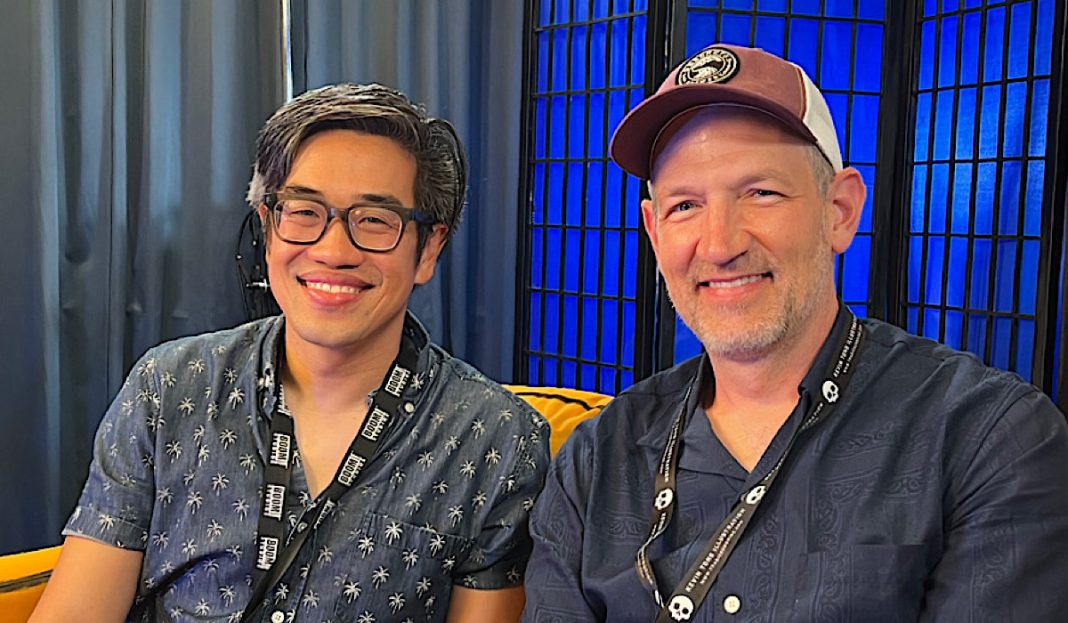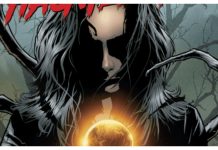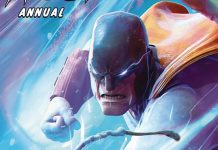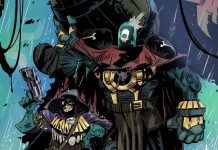Pornsak Pichetshote (The Good Asian, Infidel) has long admired the artistry of Terry Dodson (Spider-Man/Black Cat: The Evil that Men Do, Uncanny X-Men). So, when Pichetshote had the chance, he recruited Dodson to his new creative cause. Friendship blossomed and along with it, mutual respect and appreciation. All this is on full display as the duo sit together to talk about their creative collaboration on the one shot, The Horizon Experiment: The Manchurian.
The Horizon Experiment is a series of five one shots that feature protagonists from marginalized backgrounds who are thrown into an assortment of genres to surprising ends. Pichetshote and Dodson’s Manchurian is the first book in the series and will star Bond-like Chinese super spy in the lead role.
Pichetshote co-edits the one shot series with acclaimed writers as Tananarive Due (The Keeper), Sabir Prizada (Moon Knight, Ms. Marvel), J. Holtham and Vita Ayala (X-Men, Wonder Woman). Image Comics will release The Manchurian on September 25, with the others following monthly.
Nancy Powell: How did you come up with this idea about the one shot and why the one shot?
Pornsak Pichetshote: I had a book called The Good Asian that came out. It did well, it won some awards, and the sales were good. One of the things I’ve heard a lot about was people saying that ‘Wow, I love stuff like this. I wish there was more stuff like this, of just taking something from a specific sort of perspective and seeing how it changes the genre and makes the genre different.’ And I wanted to see that too. So, then I reached out to a couple writers that I knew were great and they were so talented, trying to break into comics. They’ve since all broken into Marvel and DC, but at the time, they weren’t breaking into comics.
I was like, hey, here’s a crazy idea. I want to do these stories that are basically protagonists of color from a very specific background, put them in a popular genre. Change the background of the character, and the whole story gets changed. Would you guys be interested in doing this? And they’re like, absolutely! But the thing is, I couldn’t promise a four-issue miniseries and all that sort of stuff. But we realized between all of us, we could do a pilot, we could do a one shot. Then based off that issue with Image, it would give us an advance for two of the riders I really had in mind and who couldn’t necessarily afford to finance it all themselves.
Also, the one shots are like a history of comics. I call it a showcase series because I just think it must have been so cool to live in a time of a DC showcase and have a subscription, when comics actually came to your door, and every month you got a new issue. And as some months it was Flash and other months it was Jason’s Quest. You had no idea what you were going to get. And you know, it was just a whole set of ones and then maybe there was more to that. I just love that traditional context. And it felt like a risk responsible way to put stuff out.
Powell: How did the collaboration between you and Terry [Dodson] come about? What was the process like?
Pichetshote: Well, I was it’s funny. I’ve said this a few times, but when I had the concept, I very much was, ‘Okay, what we really would need is a Terry Dodson type,’ and my editor, Will, went ‘Have we thought about asking Terry?’ I just didn’t think Terry was going to say yes. I thought he worked on so much big stuff.
And so, even after you said yes, I was waiting for you to back out. I’m waiting for you to tell me I’m too busy to do this. I know, I know. You’re drawing everything. I get it. I got it. And then I put all the scripts the way you normally did. And Terry took it over from there and worked his magic.
Terry Dodson: We actually met in San Diego two years ago at the Eisners. We were at the same table. We’d never met. And so, from there, we met up and it wasn’t long after that that this idea came up.
It’s always great to meet someone in person first and coming from that perspective where you’re not just being pitched a job. And then you work the other way, which I think is actually a very healthy way. It’s not a way you can manufacture a job, but it’s really nice to have personal connections. You take on jobs from someone you admire or respect or know, and that makes a big difference in how you’re treated. I said yes as soon as I heard the pitch and how it was going to be developed and promoted.
I’m someone who has worked as a freelance artist career and so I understand the importance of selling yourself and selling the work because there’s stuff you want to do but you can’t always get that fee for it or get support for it. So, the idea of doing this soloized experiment where you’re all supporting each other to get the word out because we live in a world of likes and favorites, and if you don’t get that attention, how do you sell it? You can do the best work that you do, but how do you sell it to anybody if they don’t know about it? And this idea was a solid idea. And then the way they’re going to promote it was exceptionally solid. That’s great because I’m someone who’s spent his whole career having to be my own boss and promote what I do in order to do because no one else is going to do it for me.
Pichetshote: One of the one of the great things about working with Terry is I was a fan of Terry for so long. And so, I knew it was hard. Working with and talking to Terry, I have so much appreciation. There’s a business to being Terry Dodson, and having him talk me through the business of being Terry Dodson, how you pick the project and how you do this and how you do that–all so you can do all those things–has been really fascinating and eye opening, having that perspective come in with the whole Horizon Experiment where we’re all trying to promote each other. I feel like that’s certainly what I wanted. In the best version of this, it’s a place where all of us can work on books that are distinct and unique, but it’s a rising tide; our voices don’t cancel each other out. If anything, they boost each other up.
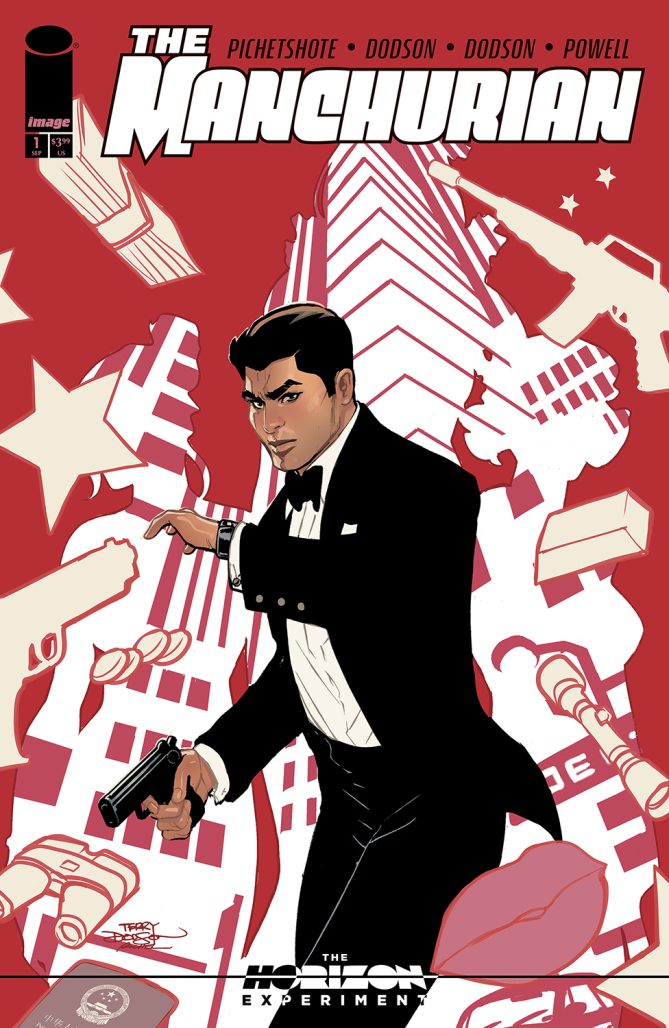
Powell: Did you do most of the work like in person, by email, or by phone?
Dodson: We talked in San Diego last year, and we talked in New York in October, and in between those times I think you wrote the bulk of the scripts. It was nice because we actually met and talked in person, which is rare.
Pichetshote: That’s true.
Dodson: We kind of went through a game that given the bits in person between San Diego and New York, you wrote it and then in New York we talked about it again. And that’s all because I was so busy that I was pushing things back. Pornsak allowed me the time to kind of work on a little bit but then to understand where we’re going and plenty of time to research it, and write when the time came.
Powell: What Are some of the challenges of working with a one shot versus working with a longer series?
Dodson: On the artistic it’s no different. The first issue of anything I do, whether it’s one issue or twelve, the first issue takes forever. The only disadvantage would be if I only get one issue and I put all this time into one issue. But that’s a whole other thing. But every first issue I do, no matter what I do, is the same process. My first issue always takes a long time because I’m developing the world. The second goes faster. Third issue or the fourth or the fifth all accelerates because I’ve done all the hard work on that first issue.
Pichetshote: It’s funny because I remember when we started this process, it was exactly what he says. All the work is making everything come together. As the pages were coming in, they were all gorgeous, but oh my god, when is this going to get done? Then it hit a point when it was like shot out of a cannon. After that, the pages kept coming along the way.
Dodson: Right on schedule.
Pichetshote: So, it was really fascinating in my mind. We actually have 26 pages to every one shot to make everything happen. And so, it’s about consolidating the space and making sure everything punches the way it needs to.
Powell: Do you think this can be a trend of the future where we go back to that one shot?
Pichetshote: I would love that. I would love if we took some more chances with stuff if there’s any trend that comes from this. This is what comics used to be. We talked about this at DC. It used to be, we have eight pages to fill by 6pm, so let’s figure something out over lunch. That lunch happens to be about Kalypso. Done! Eight pages about Kalypso. Cut to 40 years later and you’ve got an executive who wants to turn Kalypso into a four-quadrant movie, a franchise. We used to experiment so much more in comics. And so, what I love the most with these one shots is they are two or three per series. And I like sampling the series. I just love with first issues in general.


